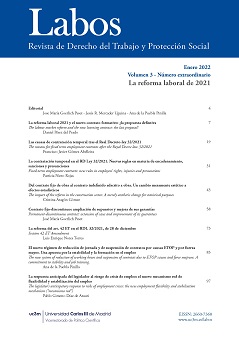The new system of reduction of working hours and suspension of contracts due to ETOP causes and force majeure. A commitment to stability and job training
Abstract
Although the reform of temporary employment regulation files was not contemplated in the labor regulation reform plans, the experience accumulated during the COVID-19 health pandemic has prompted the reform of art. 47 ET in order to incorporate some measures that have been shown to be particularly effective. The novelties in said regulation respond to the purpose of designing an ERTE model that operates as a useful and agile instrument for managing temporary crises that affect companies, as an alternative mechanism to job destruction decisions and as an opportunity to improve the professional qualification of workers. The study analyzes, in particular, the tools that allow these purposes to be met - the flexibility of the processing and management of ERTEs, the commitment to the training of workers, the preference for the reduction of working hours compared to the suspension of contracts and financial aid to ERTEs. The effect that the entry into force of the reform of art. 47 ET generated on ERTEs alive or in process as of December 31, 2021.
Downloads
Copyright (c) 2022 LABOS Revista de Derecho del Trabajo y Protección Social

This work is licensed under a Creative Commons Attribution-NonCommercial-NoDerivatives 4.0 International License.
Loa autores ceden a la Revista Labos los derechos de reproducción y distribución, así como cualquier forma de explotación del trabajo.




